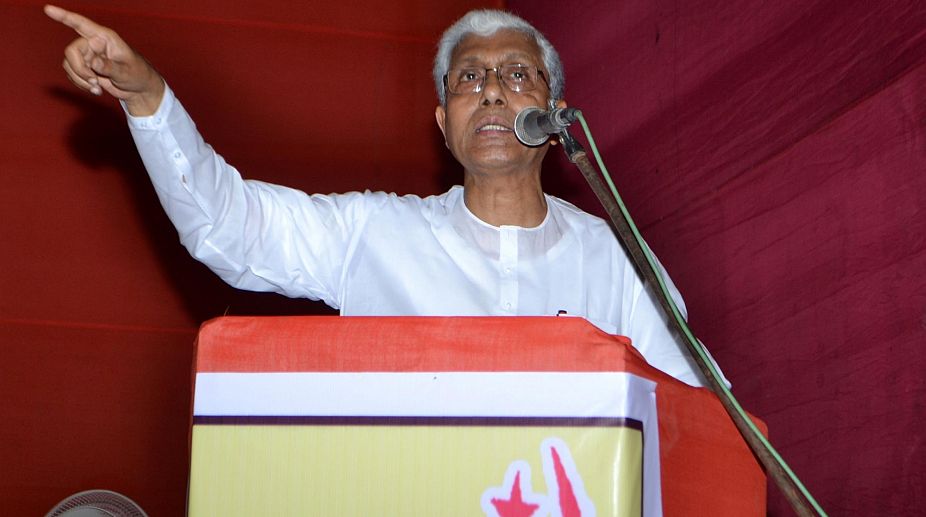The Dhanpur constituency in Sipahijala district has emerged as one of the main battlefields in poll-bound Tripura with its hillocks and paddy fields dotted with red and saffron flags.
The constituency, bordering Bangladesh, is the home turf of Chief Minister Manik Sarkar. He is looking forward to his fifth straight victory from the seat in the February 18 polls.
Advertisement
This time, however, Sarkar’s CPI(M) is pitched not just against its old rival Congress, but also the saffron party that has been making steady inroads into the state.
The BJP has fielded its state general secretary Pratima Bhowmick from the seat. This is the second time Bhowmick will be locking horns with Sarkar. She fought and lost the elections from this seat way back in 1998.
The Congress has nominated former minister Laxmi Nag from the seat.
The saffron party’s high-profile campaign in Tripura, however, has projected Bhowmick as Sarkar’s main contender in this election.
Prime Minister Narendra Modi, during a rally on February 8, had asked the voters to throw away Manik (the Manik Sarkar government) and go for HIRA (H for highways, I for Internet way, R for roadways and A for airways).
Dhanpur, largely agrarian in nature, has 21 villages, mostly inhabited by Hindus, Muslims and tribal people. Muslims live near the India-Banglagesh border and the tribal groups reside in the hilly areas.
According to the state government, the rate of literacy in Dhanpur is around 80 per cent. The constituency has eight rural hospitals, consisting of 10 to 30 beds each, and three primary health centres.
The chief minister said, “When I first came here in 1998, there were no proper roads. My vehicle got stuck in muddy roads and I had to get down to push it forward. Now a highway runs through the constituency and many concrete roads have been laid in the region.”
The constituency also lacked drinking water facilities and women, with vessels, would go around in search of water. Pipelines have been extended from the border areas to the hills, Sarkar said.
The BJP candidate from the seat, however, countered Sarkar’s claims saying clean water remains a distant dream for the villagers here.
“Most of the water supply points do not function properly and there is no iron removal system in the pipelines. People cannot consume the water supplied to them. They are forced to drink water from rivulets, the main source of gastroenteritis bacteria,” Pratima Bhowmick said.
Unemployment is the other big problem in this constituency, she said, adding, “At least 5,000 youth from here have migrated to the Middle East in search of jobs. We would bring them back and provide them employment once the BJP comes to power.”
Criticising the healthcare facilities here, Congress candidate Nag said the hospitals in Dhanpur hardly have any doctors.
“Most of the rural hospitals are run by the pharmacists. People are deprived of proper care and treatment,” she claimed.
As Bangladesh is a ‘dry country’, demand for drugs and cough syrups like Corex and Phensdyl are always high there.
The Subdivisional Magistrate (SDM) of Sonamura in Sipahijala district, Sumit Lodh, said youth here often indulge in drug smuggling across the border.
The residents of Dhanpur, however, are divided in their opinion.
Esnehar Begum of Dakshinn Maheshpur village said people living near the border areas often face problems because they have their properties distributed on both sides of the barbed wire fence.
The fence has been built 150 yards from the international border in adherence to a border management agreement signed between Bangladesh and India in 1975.
“There are people who have been evicted from the border areas and were not properly rehabilitated. We have lands on both sides of the barbed wire fencing, but our movements have been restricted by the BSF,” she said.
Musharaf Hussain, a villager from Kalikrishnanagar, said, “The main problem is that our representatives barely visit the region. This time we are thinking of extending our support to the BJP.”
Haridas Bhowmick, a resident of Bhavanipur village in the constituency, however, is happy with the Left Front regime.
“Roads and bridges have been built in this area, thanks to Sarkar. Moreover, we live here in peace with no conflict between the communities,” he said.
Sarkar, on his part, said as the chief minister, he has to look after the entire state and cannot focus on just one constitituency.
“Our party workers always keep a vigil on the problems of people in Dhanpur and I, too, respond to their problems,” he said.
The state is slated to go to polls this Sunday. The BJP-IPFT alliance in the state is being considered as the main rival of the CPI(M)-led Left Front, which has been in power in the northeastern state for the last 25 years.
The results of the Tripura election will be declared on March 3.
















